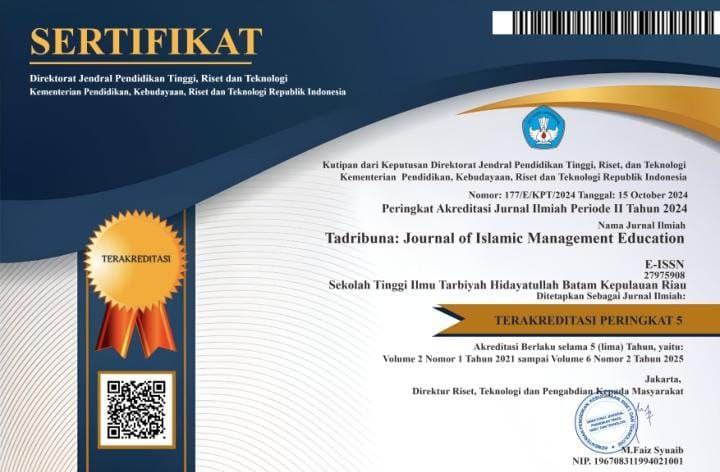Efektivitas Penggunaan Rapor Digital Madrasah (RDM) Berbasis Website di MAS Al Huda Bengkalis
Abstract
The research purpose is to analyze the effectiveness of the use of Website-based RDM as well as the supporting and inhibiting factors the effectiveness of the use of Website-based RDM at MAS Al Huda Bengkalis.The research method is qualitative research. The research results show that the use of Website-based RDM received a positive respons from informants and was considered effective in supporting the evaluation process and monitoring learning outcomes.. This is marked by the achievement of goals in accordance with the expectations and targets determined, good and fast adaptability by RDM users, the creation of job satisfaction, and the existence of a sense of full responsibility from all parties involved in the implementation of value processing activities.
References
Arif, M., Munaya, A., Imtiyazi, R. N., & Slamet, C. (2023). The Relationship between Management Information Systems Based on Rapor Digital Madrasah ( RDM ) and the Quality of Madrasah Education. Cendikia Jurnal Kependidikan Dan Kemasyarakatan, 21(2), 253–267.
Arnida, S. . (2018). Tujuan Pembangunan Berkelanjutan di Indonesia. Pustaka Ramadhan.
Fajrin, N., & Machali, I. (2023). Implementasi Penggunaan Rapor Digital Madrasah (RDM) Berbasis Online dalam Menyusun Administrasi Penilaian Hasil Belajar Peserta Didik. Jurnal Idaarah, 7(1), 177–189.
Fermi Yunita, Burhanuddin, A. (2022). Efektivitas Penerapan Sistem Informasi Manajemen Pengembangan Sumber Daya Manusia Kabupaten Gowa. Jurnal Unismuh, 3, 1273–1285. https://journal.unismuh.ac.id/index.php/kimap/index
Gupta, A. et. a. (2021). Affective Teacher Tools: Affective Class Report Card and Dashboard. In: Roll, I., McNamara, D., Sosnovsky, S., Luckin, R., Dimitrova, V. (eds) Artificial Intelligence in Education. AIED 2021. Lecture Notes in Computer Science, vol 12748. https://doi.org/10.1007/978-3-030-78292-4_15
Hadi, A., Asrori, & Rusman. (2021). Penelitan Kualitatif. CV.Pena Persada. http://repository.uinsby.ac.id/id/eprint/167/
Hardani, Helmina Andriani, Jumari Ustiawaty, Evi Fatmi Utami, Ria Rahmatul Istiqomah, R. A. F. (2022). Buku Metode Penelitian Kualitatif & Kuantitatif. In LP2M UST Jogja (Issue March). CV. Pustaka Ilmu Group.
Haury, A. M., Widodo, S., & Hikmawan, R. (2024). Comparative Study of Processing Student Learning Results Scores using Microsoft Excel with the RDM (Digital Madrasah Report Card). International Journal Software Engineering and Computer Science (IJSECS), 4(1), 301–. https://doi.org/10.35870/ijsecs.v4i1.2108
Hikmawati, F. (2020). Metodologi Penelitian. PT Raja Grafindo Persada.
Jasmansyah. (2021). ICT in Education (Teori dan Praktik TIK dalam Pendidikan). Zahir Publishing.
Murdiyanto, E. (2020). Metode Penelitian Kualitatif (Sistematika Penelitian Kualitatif). Yogyakarta Press. http://www.academia.edu/download/35360663/METODE_PENELITIAN_KUALITAIF.docx
Mustari, M. (2023). Teknologi Informasi dan Komunikasi Dalam Manajemen Pendidikan. Gunung Jati Publishing.
Nasution, A. F. (2023). Metode Penelitian Kualitatif. CV. Harfa Creative.
Nor Asiah Razak, Roznim Mohamad Rasli, Suvarmani Subhan, Nor Aniza Ahmad, S. M. (2023). Systematic review on digitak transformation among teachers in public schools. International Journal of Evaluation and Research in Education (IJERE), Vol 12 No. http://doi.org/10.11591/ijere.v12i2.24498
Parera. (2020). Dasar-Dasar Manajemen. PT Bumi Aksara.
Pratama, M. A., Penpanani, Y., & Suherli, N. (2022). Implementasi Aplikasi Raport Digital Madrasah ( RDM ) dalam Penilaian Hasil Belajar Siswa. Jurnal Media Dan Teknologi Pendidikan, 2(2), 91–97.
Putri Hana Pebriana, e. a. (2020). Metodologi Penelitian. CV. Dotplus Publisher.
Ramadhani, F. (2022). Implementasi Aplikasi Rapor Digital Madrasah (RDM) di MTs Fatahillah Semarang. Universitas Islam Negeri Walisongo.
Rosmini, S., Samrin, Alim, N., & Badarwan. (2021). EFEKTIVITAS PENGGUNAAN APLIKASI RAPOR DIGITAL DI. Journal Pendidikan Islam, 2(1), 41–46.
Sahir, S. H. (2022). Metodologi Penelitian. Penerbit KBM Indonesia.
Saleh, S. (2017). Analisis Data Kualitatif. Pustaka Ramadhan. https://core.ac.uk/download/pdf/228075212.pdf
Shaturaey, J. (2021). Financing and Management of Islamic (Madrasah) Education in Indonesia. The Central European Journal of Social Science and Humanities, 57–65.
Sidiq, U., & Choiri, M. (2019). Metode Penelitian Kualitatif di Bidang Pendidikan (Vol. 53, Issue 9). CV. Nata Karya. http://repository.iainponorogo.ac.id/484/1/METODE PENELITIAN KUALITATIF DI BIDANG PENDIDIKAN.pdf
Sriwati. (2022). The Impact of Digital Culture in the Curriculum 2013 Report Card Processing Process in Elementary Schools. Jurnal Pendidikan Indonesia, 1(01), 1. https://doi.org/10.58471/ju-pendi.v1i01.246
Suyuti, S., Ekasari Wahyuningrum, P. M., Jamil, M. A., Nawawi, M. L., Aditia, D., & Ayu Lia Rusmayani, N. G. (2023). Analisis Efektivitas Penggunaan Teknologi dalam Pendidikan Terhadap Peningkatan Hasil Belajar. Journal on Education, 6(1), 1–11. https://doi.org/10.31004/joe.v6i1.2908
Tsauri, S. (2014). Manajemen Kinerja. STAIN Jember Press.
Wahidin, A., Tazqiatunnafsi, H., & Nurhabibah, W. (2023). Penilaian Hasil Belajar Melalui Aplikasi Rapor Digital Madrasah di Lembaga MAS YBH Cimindi. Jurnal Pelita Nusantara, 1(1), 6–15. https://doi.org/10.59996/jurnalpelitanusantara.v1i1.111
Yang, T., & Hong, X. (2022). Early childhood teachers’ professional learning about ICT implementation in kindergarten curriculum: A qualitative exploratory study in China. Frontiers in Psychology, 13(October), 1–12. https://doi.org/10.3389/fpsyg.2022.1008372







